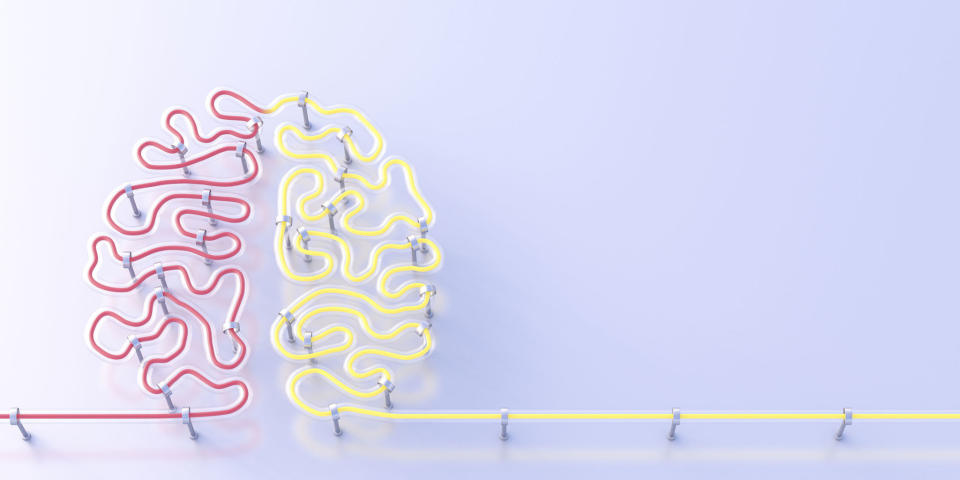4 Easy Things All Women Can Do Now to Prevent Alzheimer's Disease

1) Brain Health Tips
Love, feed, and care for your most overworked and overlooked body part-your brain. It will thank you now, and love you back later.

2) Move around.
Walk. Dance. Play with the dog. Physical activity clears out a substance called amyloid, which is believed to accumulate and "gunk up" the brains of people with Alzheimer's. Amyloid starts building a decade-maybe even two-before symptoms start. "The only thing we know of that can lower amyloid in the brain is exercise," says Dr. Isaacson. A little physical activity is such a potent health player that active people have a 35 percent lower risk of mental decline than sedentary ones. A study published in the journal Neurology found that the better shape you are in early on, the better your brain will be in the future. (More-fit people had stronger brain abilities 25 years later than less-fit folks.)
Start Today:
Get your blood pumping: Aim to get at least 20 to 30 minutes of purposeful activity most days of the week (in other words, anything that ups your heart rate).
Do strength training: Complete two short sessions of resistance training a week (you don't have to lift weights-squats and lunges are great).
Stay active a.m. to p.m.: Pour yourself half a cup of coffee, then get up to refill it; walk instead of driving to the ATM. Find small ways to move more.

3) Let your mind play.
Thinking in a new or deeper way can help shore up your mental prowess (no fancy computer games or Sudoku puzzles needed!), says Sandra Bond Chapman, Ph.D., founder and chief director of the Center for BrainHealth at the University of Texas. Talking about the key themes in a movie rather than just rehashing the plot counts as thinking deeply because it requires reasoning and attention. Coming up with a new way to say thank you to someone or to gather with your friends for some bonding time counts as being innovative. Novelty, variety, feeling engaged, and being challenged all build a healthier mind.
This type of thinking isn't difficult to do, but it's easy to crowd out, says Chapman. Simply executing the same rush-rush routine day after day squanders your mental energy and cheats your brain out of making stronger, more essential connections. (These strengthened connections are a resource that your brain can use if the main pathways get weakened by aging or clogged up later as a result of the plaques that form with dementia.) Even though you likely can't change what's on your schedule, you can aim to think differently and add some brain-healthy pauses to your day.
Start today:
Create a few stopping points: Pressing through and doing more, more, more isn't always helpful. "The more information we take in, the more shallowly we think," says Chapman. Getting away for a few minutes can quiet some of the mental noise that's getting in the way of the thinking that's valuable to your brain. Every so often, step away from what you're doing and walk around to clear your head.
Take the road less traveled: Find a new route when you are strolling around your neighborhood. This will refresh your neural networks to make them fire more efficiently.
Try something different: Make an effort to engage in one or two new activities per day, like calling a person you recently met, exploring a different type of book genre, or eating a food you've never had before.
Put your phone away for one hour twice a day: "If you don't have your cell phone next to you for a few one-hour stints, you'll be able to solve problems you hadn't even realized were bothering you and think more clearly," says Chapman.

4) Set up an ideal snoozing scenario.
Shut-eye time is when your brain does its housekeeping. "It's almost like there's a janitor inside that cleans up some of the toxic by-products that may be a precursor to amyloid," says Chapman.
Start Today:
Change the way you think about bedtime: Getting less sleep than the next person isn't a virtue, and sleep isn't an activity you should cut when time gets tight. Reframe the hours you spend under the covers as a priority and a must-do, like other appointments on your schedule.
Take stock of your sleep hygiene: Your routine and environment matter when it comes to snoozing better. For starters, light can confuse your natural sleep/wake cycles, so use blinds or blackout shades to ensure that you sleep in a dark, quiet room. And banish screens from your bedroom: The blue light emitted by TVs, phones, and iPads keeps you from producing melatonin, a sleepiness hormone that rises in your body at night.
Stick to a schedule: Even as seemingly small a change as getting up at a different hour on the weekends can throw your body off. Maintain a consistent bedtime and wake-up time.

5) Do right by your heart, and your brain will also benefit.
All those healthy moves you're making to keep your ticker in shape? Your brain loves them too. In other words, what's good for your heart is good for your brain.
Start Today:
Know your numbers: Risk factors for Alzheimer's are similar to those for heart disease and include high blood pressure, off-kilter cholesterol numbers, obesity, and diabetes. So learning your numbers and working to manage them means you're helping to keep your Alzheimer's risk in check as well.
Eat the Mediterranean way: A review of the top evidence by the Alzheimer's Association found that this heart-healthy eating pattern is associated with a reduced risk of cognitive decline, as is combining Mediterranean eating with the DASH (Dietary Approaches to Stop Hypertension) diet. DASH meals are similar to Mediterranean ones, with an extra focus on fiber and protein to squelch hunger. Pile your plate with whole grains, fruits and vegetables, fish, and nuts. Cook with olive oil, and consider meat a condiment (not the main star).
Love, feed, and care for your most overworked and overlooked body part—your brain. It will thank you now, and love you back later.